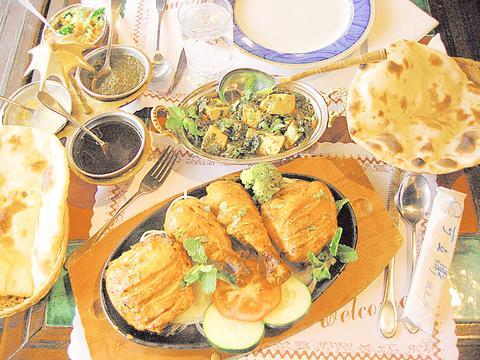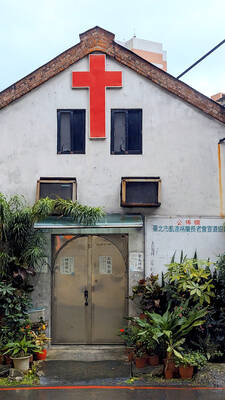For the past decade, Karachi native, Muhammad Ali, has been cooking up a storm with his authentic, flavorsome and at times tongue numbing Pakistani and Indian fare.
Originally located amid the chaos of the bustling Ninghsia Rd., (寧夏路) and its ever-busy night market, but for the last three years Ali has been operating out of the second floor of a commercial building on Nanjing East Road (南京東路).

PHOTO: GAVIN PHIPPS, TAIPEI TIMES
Vegetarian and non-vegetarian dishes such as sizzling spice-infused tandoori chicken (NT$280 to NT$550), nut-loaded and creamy masalas (NT$200 to NT$280), yogurt-based makhanwallas (NT220 to NT$340) and fiery hot vindaloos (NT$290) provide a range of flavors that will be popular with new-comers and hardened curry fanciers.
And of course, what curry restaurant would be complete without the fine breads to accompany the meal. Here too Ali Baba's doesn't disappoint with the choice of reasonably priced breads including butter naan, garlic naan, allo paratha (bread stuffed with potatoes), keema naan (bread stuffed with minced lamb) and plain naan, just to name a few.
If you still have room after the main course, then check out the desserts, which are as authentic as all the other fare. Gulab juman (NT$80), the popular small cake balls made from milk and flour deep-fried and served in a light sugar syrup, and gajar halwa (NT$100), a carrot based dessert made with milk and sugar and best served with ice cream are a great way to complete any meal.
In the coming weeks Ali is set to introduce his new menu. Along with the addition of glossy photos of all the dishes on offer, the ever-jovial restaurateur has added nearly a dozen new creations to the already extensive inventory.
While Ali will be the first to admit that several of the seafood based new additions are far from authentic, he has taken steps to include half-a-dozen or so dishes from his homeland, Pakistan, that are rare finds in Taipei.
These include authentic Karachi dishes such as haleem, mutton cooked with several varieties of beans and rice, and paya, a slightly bony dish made of slowly cooked lambs' feet and spices -- a dish Ali describes as "a meal for men."
For those looking to sample a mixture of South Asian flavors at one sitting, Ali Baba's offers a reasonably priced weekend buffet. Priced at NT$399, the buffet changes every weekend, but always includes a good choice of both vegetarian and non-vegetarian curries, kormas, masalas, do piazas, daals and so on.
Although, for obvious reasons, alcoholic beverages are not served at Ali Baba's, diners wishing to enjoy a drink or two with their meal are free to bring their own without fear of either offending the staff or paying an annoying corkage charge.

Following the rollercoaster ride of 2025, next year is already shaping up to be dramatic. The ongoing constitutional crises and the nine-in-one local elections are already dominating the landscape. The constitutional crises are the ones to lose sleep over. Though much business is still being conducted, crucial items such as next year’s budget, civil servant pensions and the proposed eight-year NT$1.25 trillion (approx US$40 billion) special defense budget are still being contested. There are, however, two glimmers of hope. One is that the legally contested move by five of the eight grand justices on the Constitutional Court’s ad hoc move

Stepping off the busy through-road at Yongan Market Station, lights flashing, horns honking, I turn down a small side street and into the warm embrace of my favorite hole-in-the-wall gem, the Hoi An Banh Mi shop (越南會安麵包), red flags and yellow lanterns waving outside. “Little sister, we were wondering where you’ve been, we haven’t seen you in ages!” the owners call out with a smile. It’s been seven days. The restaurant is run by Huang Jin-chuan (黃錦泉), who is married to a local, and her little sister Eva, who helps out on weekends, having also moved to New Taipei

The Directorate-General of Budget, Accounting and Statistics (DGBAS) told legislators last week that because the Chinese Nationalist Party (KMT) and Taiwan People’s Party (TPP) are continuing to block next year’s budget from passing, the nation could lose 1.5 percent of its GDP growth next year. According to the DGBAS report, officials presented to the legislature, the 2026 budget proposal includes NT$299.2 billion in funding for new projects and funding increases for various government functions. This funding only becomes available when the legislature approves it. The DGBAS estimates that every NT$10 billion in government money not spent shaves 0.05 percent off

Dec. 29 to Jan. 4 Like the Taoist Baode Temple (保德宮) featured in last week’s column, there’s little at first glance to suggest that Taipei’s Independence Presbyterian Church in Xinbeitou (自立長老會新北投教會) has Indigenous roots. One hint is a small sign on the facade reading “Ketagalan Presbyterian Mission Association” — Ketagalan being an collective term for the Pingpu (plains Indigenous) groups who once inhabited much of northern Taiwan. Inside, a display on the back wall introduces the congregation’s founder Pan Shui-tu (潘水土), a member of the Pingpu settlement of Kipatauw, and provides information about the Ketagalan and their early involvement with Christianity. Most